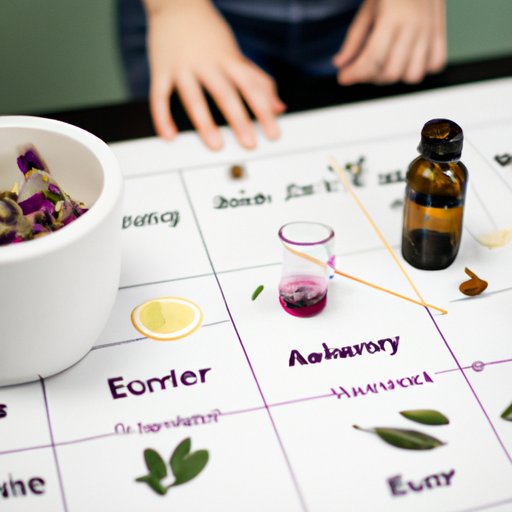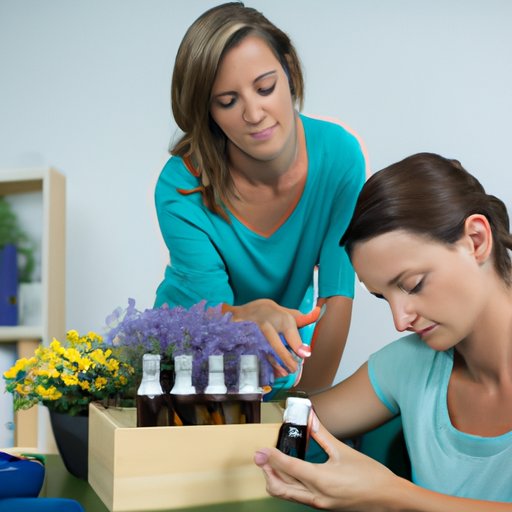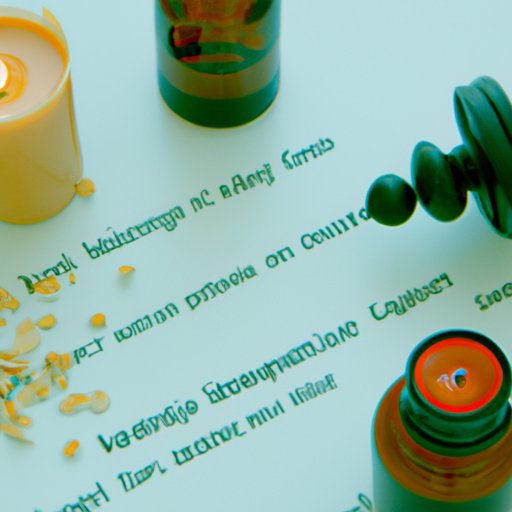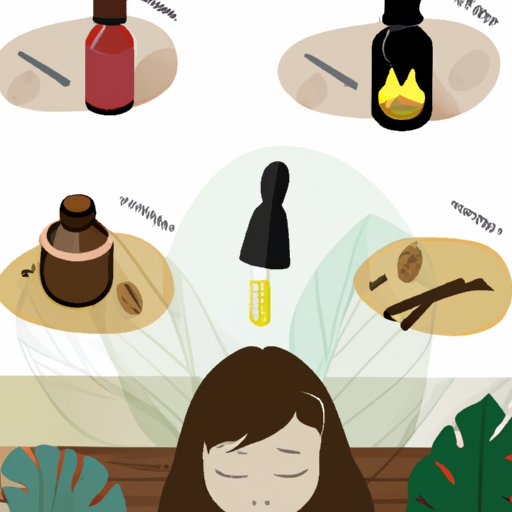Introduction
Aromatherapy is an ancient practice of using plant-based essential oils to improve physical and emotional health. It has been used for centuries to treat a wide variety of ailments and to promote relaxation and wellbeing. This article will explore the science behind aromatherapy, examine the different types of essential oils used, investigate the various methods of application, and understand the psychological effects of aromatherapy.

Exploring the Science Behind Aromatherapy
So how does aromatherapy work? The therapeutic properties of essential oils are believed to be due to their ability to interact with the body’s nervous system. Essential oils are composed of tiny molecules that can easily enter the bloodstream through inhalation or topical application. Once in the bloodstream, these molecules interact with the olfactory receptors in the brain, triggering responses in the limbic system, which is responsible for controlling emotions and memory.
The type of essential oil used in aromatherapy depends on the desired outcome. Each oil contains unique chemical compounds that offer different benefits. Commonly used essential oils include lavender, tea tree, peppermint, eucalyptus, and rosemary. Each of these oils has a distinct aroma and offers a variety of therapeutic benefits.
Investigating the Different Methods of Aromatherapy Application
Aromatherapy can be applied in three ways: inhalation, topical application, and internal consumption. Inhalation is the most common method of aromatherapy application and involves inhaling the scent of the essential oil directly from the bottle or using a diffuser to disperse the essential oil into the air. Inhalation is thought to be the most effective way to receive the therapeutic benefits of essential oils.
Topical application involves applying essential oils directly to the skin. Essential oils can be diluted with a carrier oil such as jojoba oil or coconut oil before applying them to the skin. It is important to remember that some essential oils can cause skin irritation and should be used with caution. Internal consumption of essential oils is not recommended and should only be done under the supervision of a qualified professional.

Understanding the Psychological Effects of Aromatherapy
Aromatherapy has been found to have a positive effect on mood and stress levels. Studies have shown that certain scents can trigger the release of endorphins, which are hormones that help to reduce stress and induce feelings of happiness and relaxation. Additionally, aromatherapy can help to reduce anxiety, depression, and insomnia.
The psychological effects of aromatherapy can also be beneficial in promoting overall well-being. Aromatherapy can help to clear the mind and increase focus, as well as reduce fatigue and tension. Additionally, it can help to reduce headaches and muscle aches, as well as improve sleep quality.

Comparing the Cost and Availability of Aromatherapy Treatments
Aromatherapy treatments can vary in cost depending on the type of essential oil used and the method of application. Essential oils can be purchased from health food stores, online retailers, and specialty stores. Prices can range from a few dollars for small bottles of essential oils to hundreds of dollars for larger quantities. Professional services such as massage therapy or spa treatments may also be available and can be more expensive.
Aromatherapy treatments are becoming increasingly available and accessible. Many spas and wellness centers now offer aromatherapy services, and some even specialize in aromatherapy treatments. Additionally, there are many books and websites that provide detailed information about the use of essential oils and the various methods of application.
Conclusion
Aromatherapy is an ancient practice that has been used for centuries to improve physical and emotional health. The science behind aromatherapy reveals how the tiny molecules of essential oils can interact with the body’s nervous system to produce therapeutic effects. There are a variety of essential oils that can be used for different purposes, and these can be applied in three ways: inhalation, topical application, and internal consumption. Aromatherapy has been found to have a positive effect on mood and stress levels, as well as promote relaxation and overall wellbeing.
Aromatherapy treatments vary in cost depending on the type of essential oil used and the method of application. Essential oils can be purchased from health food stores, online retailers, and specialty stores. Professional services such as massage therapy or spa treatments may also be available and can be more expensive. Aromatherapy treatments are becoming increasingly available and accessible, making it easier for people to experience the benefits of this ancient practice.
(Note: Is this article not meeting your expectations? Do you have knowledge or insights to share? Unlock new opportunities and expand your reach by joining our authors team. Click Registration to join us and share your expertise with our readers.)
